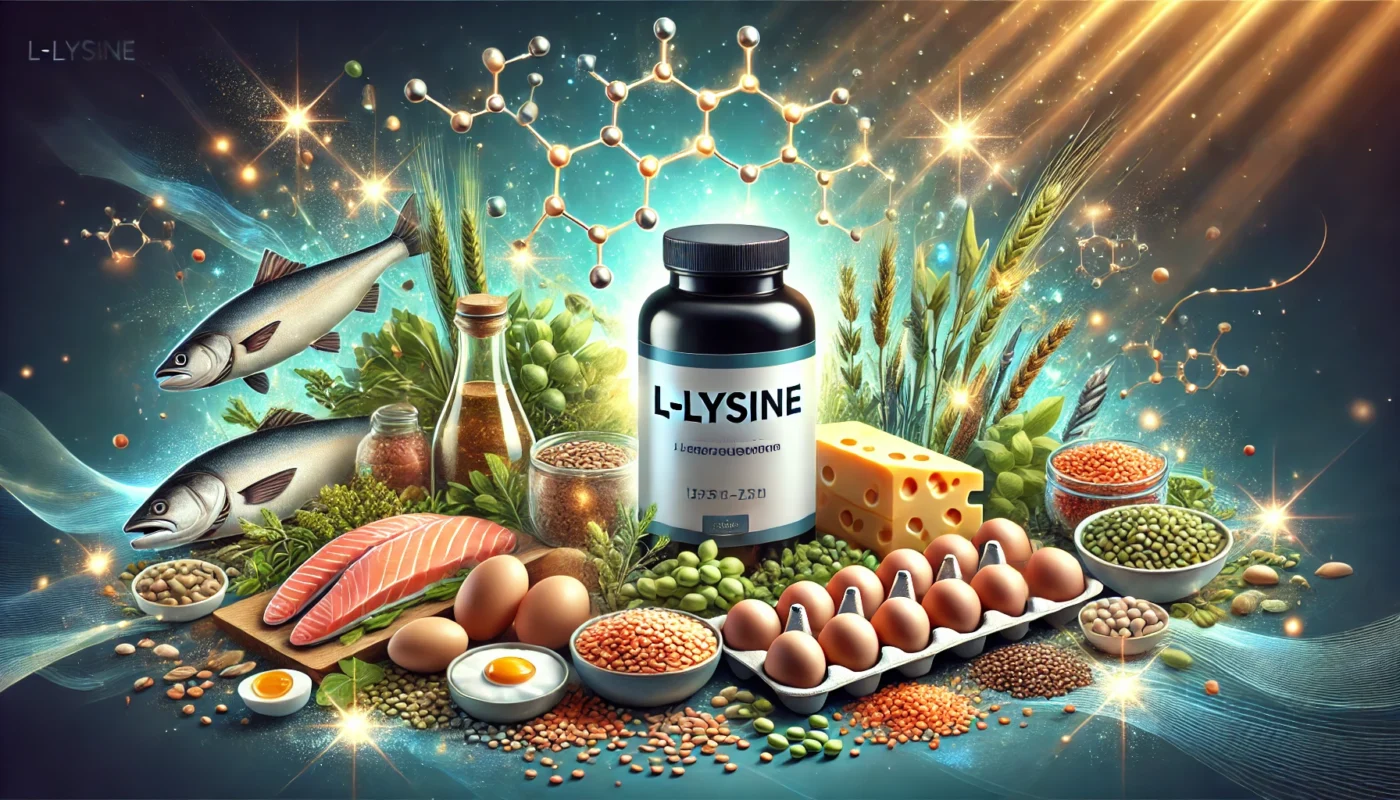L-lysine, one of the nine essential amino acids, is vital for a multitude of physiological functions. From immune health to protein synthesis and collagen production, L-lysine plays a critical role in the body. However, unlike non-essential amino acids, L-lysine must be obtained from dietary sources because the body cannot produce it on its own. If you’re not getting enough of this essential nutrient, it can lead to several health issues, including fatigue, frequent infections, and delayed wound healing. In this article, we will explore the signs of L-lysine deficiency, the importance of maintaining healthy levels, and the best ways to correct a deficiency through diet and supplementation.
You May Also Like:
Are You Getting Enough L-lysine? Early Warning Signs to Watch For
L-lysine and Skin Repair: A Natural Solution for Scars and Wrinkles
Are You Getting Enough L-lysine? Signs of Deficiency and How to Correct It is an original (HSLHealing) article.
What is L-lysine and Why Is It Important?
L-lysine is an amino acid that plays a significant role in numerous vital bodily functions. It is crucial for protein synthesis, the building block for muscle, enzymes, and hormones, and is also involved in collagen production, which helps maintain healthy skin, tendons, ligaments, and bones. Furthermore, L-lysine helps support the immune system by aiding in the production of antibodies and enzymes that fight off infections.
Some of the key benefits of L-lysine include:
- Tissue Repair: L-lysine aids in the healing of wounds, fractures, and soft tissue damage.
- Immune Function: L-lysine is integral to the body’s defense system and helps to reduce the frequency of viral infections like cold sores caused by the herpes simplex virus (HSV).
- Collagen Production: L-lysine is needed for the production of collagen, which supports skin elasticity and joint health.
- Calcium Absorption: L-lysine also helps the body absorb calcium, which is crucial for bone health.
Despite its importance, the body cannot produce L-lysine, so it must be consumed through dietary sources, primarily protein-rich foods like meat, dairy, and legumes. L-lysine supplementation is often used to treat and prevent deficiencies.

Signs of L-lysine Deficiency
L-lysine deficiency is relatively rare but can occur in individuals with insufficient intake of L-lysine-rich foods or those who have conditions that impair nutrient absorption. Deficiency can manifest in a variety of ways. Some of the most common signs and symptoms of L-lysine deficiency include:
1. Fatigue and Low Energy
Fatigue is one of the most common and early signs of L-lysine deficiency. Since L-lysine is involved in protein synthesis, insufficient amounts can lead to muscle weakness and reduced energy levels. Inadequate L-lysine levels may affect the synthesis of enzymes that help generate ATP, the primary energy carrier in cells. Without enough energy, the body may feel sluggish and fatigued, even with adequate sleep.
2. Poor Immune Function and Frequent Infections
L-lysine is integral to the immune system’s functioning. It plays a key role in producing antibodies that help fight infections. A deficiency in L-lysine can lead to an increased susceptibility to infections, particularly viral ones. Research has shown that L-lysine has antiviral properties, particularly in reducing the frequency and severity of cold sores caused by the herpes simplex virus (HSV). A study published in The Journal of Clinical Nutrition found that L-lysine supplementation significantly reduced the recurrence of herpes simplex outbreaks in individuals who were prone to cold sores (Griffith et al., 2005).
Without sufficient L-lysine, individuals may notice that they get sick more often, experience longer recovery times, or have trouble fighting off viral infections.

3. Slow Wound Healing and Tissue Repair
Because L-lysine is necessary for collagen production, a deficiency can hinder the body’s ability to heal wounds and repair tissues effectively. Collagen is essential for the healing of injuries and maintaining the integrity of the skin and other connective tissues. A lack of L-lysine can lead to delayed wound healing, slower recovery from surgeries, and even skin lesions. According to a study published in The American Journal of Clinical Nutrition (1993), individuals who were given L-lysine supplements experienced faster wound healing and better tissue repair after injury.
4. Hair Loss and Skin Problems
L-lysine plays a role in the production of collagen and elastin, both of which are important for maintaining skin health. A deficiency in L-lysine can contribute to dry, flaky skin, hair thinning, and other dermatological issues. Collagen also strengthens the structural integrity of skin, preventing the formation of wrinkles and other signs of aging. In one study, L-lysine supplementation was found to improve the health and elasticity of the skin in individuals with lower dietary protein intake (Sharma et al., 2010).
5. Reduced Muscle Mass and Recovery Issues
Because L-lysine is involved in protein synthesis, a deficiency can negatively impact muscle mass and recovery, particularly after exercise or physical trauma. Insufficient L-lysine levels can contribute to muscle wasting (cachexia) and difficulty recovering from strenuous physical activity. One study in The Journal of Nutrition (2007) showed that individuals with low L-lysine intake had reduced muscle mass and slower recovery after intense exercise.

Who Is at Risk of L-lysine Deficiency?
Several groups of individuals are at a higher risk of L-lysine deficiency. These include:
- Vegans and Vegetarians: Since L-lysine is abundant in animal-based proteins, individuals who follow plant-based diets may struggle to get sufficient amounts of L-lysine. While certain plant foods, like quinoa and lentils, do contain L-lysine, they are typically lower in concentration than animal-based foods.
- Elderly: As people age, their ability to absorb nutrients decreases. Older adults often consume less protein, which can result in lower L-lysine intake. Additionally, they may have underlying medical conditions that impair nutrient absorption.
- People with Digestive Issues: Conditions such as Crohn’s disease, celiac disease, and irritable bowel syndrome (IBS) can impair the absorption of L-lysine and other essential nutrients.
- Athletes and Active Individuals: Athletes who engage in high-intensity training may need higher amounts of L-lysine to support muscle recovery and prevent muscle breakdown. Without adequate intake, they may experience slower recovery times and diminished performance.

How to Correct L-lysine Deficiency
If you suspect you have a deficiency in L-lysine, the first step is to evaluate your diet. Increasing L-lysine-rich foods is usually the first and most effective step. Here are some ways to correct a deficiency:
1. Increase Dietary Intake
Focus on consuming foods high in L-lysine. The best sources include:
- Animal-Based Sources: Chicken, beef, pork, eggs, and fish like tuna and salmon are excellent sources of L-lysine.
- Dairy: Milk, cheese, and yogurt are great sources of L-lysine, especially hard cheeses like Parmesan.
- Plant-Based Sources: For those following plant-based diets, quinoa, lentils, soy products (tofu, tempeh), and pumpkin seeds are among the best plant-based sources of L-lysine.
2. Consider Supplements
For individuals who struggle to get enough L-lysine from food, supplementation may be necessary. L-lysine supplements are available in tablet, capsule, and powder form, and can be found in most health food stores. A typical dosage for L-lysine supplementation ranges from 500 mg to 3,000 mg per day, depending on the individual’s needs and health goals.
For individuals with severe deficiency or those using L-lysine for cold sore prevention, higher doses (1,000–3,000 mg) may be necessary. However, it’s important to consult a healthcare provider before starting supplementation, especially if you have underlying health conditions or are pregnant or breastfeeding.
3. Focus on Protein-Rich Meals
Since L-lysine is an amino acid, it’s important to focus on overall protein intake. The general recommendation is to consume approximately 0.8 to 1.2 grams of protein per kilogram of body weight for adults. Active individuals or those recovering from injury or illness may require more.

Conclusion
L-lysine is an essential amino acid that plays a vital role in immune function, tissue repair, collagen production, and muscle health. Deficiency in L-lysine can lead to a variety of symptoms, including fatigue, poor immune response, slow wound healing, and skin issues. Those who are at higher risk of deficiency—such as vegans, the elderly, and athletes—should ensure they are consuming adequate amounts of L-lysine through diet or supplementation. By recognizing the symptoms of L-lysine deficiency early and taking steps to correct it, individuals can restore balance to their health and avoid the negative effects of this deficiency.

References
- Nutritional strategies to promote postexercise recovery. Retrieve from: https://pubmed.ncbi.nlm.nih.gov/21116024/
- Chronic fatigue syndrome (CFS): Suggestions for a nutritional treatment in the therapeutic approach. Retrieved from: https://www.sciencedirect.com/science/article/pii/S0753332218342987
- Dietary Supplements and Sports Performance: Amino Acids. Retrieved from: https://pmc.ncbi.nlm.nih.gov/articles/PMC2129148/
- Oral treatment with L-lysine and L-arginine reduces anxiety and basal cortisol levels in healthy humans. Retrieved from: https://pubmed.ncbi.nlm.nih.gov/17510493/
- Lysine fortification reduces anxiety and lessens stress in family members in economically weak communities in Northwest Syria. Retrieved from: https://pmc.ncbi.nlm.nih.gov/articles/PMC420386/
- L-lysine: Its antagonism with L-arginine in controlling viral infection. Narrative literature review. Retrieve from: https://pubmed.ncbi.nlm.nih.gov/35723628/
Important Note: The information contained in this article is for general informational purposes only, and should not be construed as health or medical advice, nor is it intended to diagnose, prevent, treat, or cure any disease or health condition. Before embarking on any diet, fitness regimen, or program of nutritional supplementation, it is advisable to consult your healthcare professional in order to determine its safety and probable efficacy in terms of your individual state of health.
Regarding Nutritional Supplements Or Other Non-Prescription Health Products: If any nutritional supplements or other non-prescription health products are mentioned in the foregoing article, any claims or statements made about them have not been evaluated by the U.S. Food and Drug Administration, and such nutritional supplements or other health products are not intended to diagnose, treat, cure, or prevent any disease.

